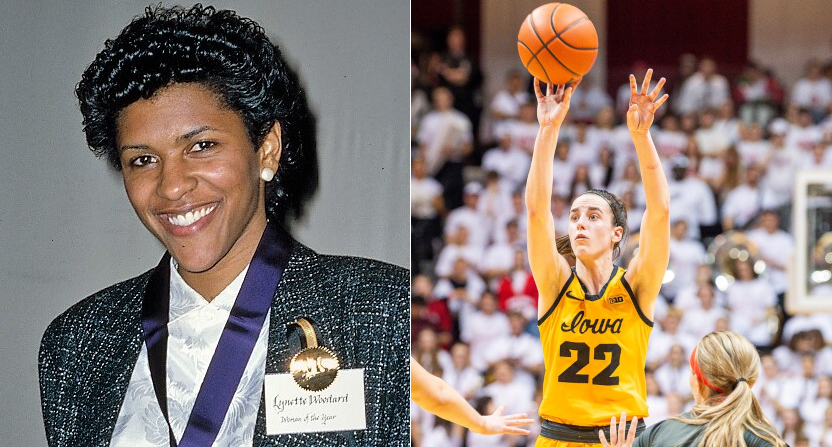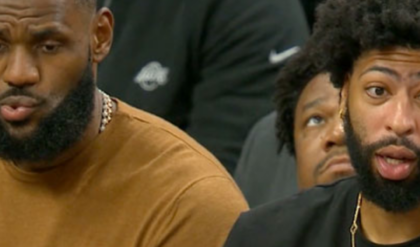Around Caitlin Clark passing Kelsey Plum in career points, Lynette Woodard’s overall women’s college basketball points mark deserves discussion, including for why the NCAA won’t acknowledge it.
 Lynette Woodard (L) and Caitlin Clark. (Woodard photo from Bernard Gotfryd at the 1986 Ms. Magazine Woman of the Year Awards, via Wikipedia. Clark photo from a Feb. 22 game against Indiana, from Rich Janzaruk/The (Bloomington) Herald-Times via USA Today Sports.)
Lynette Woodard (L) and Caitlin Clark. (Woodard photo from Bernard Gotfryd at the 1986 Ms. Magazine Woman of the Year Awards, via Wikipedia. Clark photo from a Feb. 22 game against Indiana, from Rich Janzaruk/The (Bloomington) Herald-Times via USA Today Sports.)
The AIAW operated from 1971-83, with its dissolution coming after the NCAA finally and contentiously began starting to offer women’s championships (after previously opposing the crucial Title IX legislation, which the AIAW had supported) once there started to be TV money involved. It grew out of previous efforts, including the Division for Girls’ and Women’s Sports (DGWS) of the American Association for Health, Physical Education and Recreation, the National Joint Committee on Extramural Sports for College Women, and the Commission on Intercollegiate Athletics for Women.
Thus, there were high-level intercollegiate women’s sports competitions before the AIAW. But the AIAW era is under particular focus now thanks to the NCAA’s disregard for it and how that shows up in Clark’s record chase. Sally Jenkins of The Washington Post wrote an excellent piece this weekend headlined “The NCAA erased an entire generation of women’s sports,” looking at how the organization refuses to recognize Woodard’s record (but does recognize AIAW coaching records) and the inconsistency of that to their approaches in other sports, including football (where pre-NCAA records, such as Fielding Yost’s victories, are fully counted). Here are a few standout quotes from that piece, which explores the rough conditions female athletes had to tolerate in that era but the success they found nonetheless.
“Those records should have been merged a long time ago,” Woodard says. “ … We’re so quick to erase anything we don’t like or think we don’t like. It’s just not fair. There’s a lot of history there, and it just should not be dismissed.”
…“It’s inconsistent,” [Stanford coach Tara] VanDerveer remarked in an email exchange. “These are basketball records. And women’s basketball was played at a high level before the NCAA took over governance of the women’s game.”
..“Caitlin is having a wonderful, sensational career, and when there is a high tide, all boats float,” Woodard says. “There are so many things she is making people aware of, and I think it’s a great thing. But I just hope that if the call letters ever changed on ‘NCAA,’ her records might be blended.”
There are some similarities here to the long and hard fight to get Major League Baseball to recognize Negro Leagues statistics as “major league” (which they did in December 2020, although many questions still remain about the implementation of that). As with the players who played in those leagues due to MLB’s color line, the AIAW era was not about women’s sports choosing to operate outside of the NCAA: until 1981, that organization did not want them (as Jenkins thoroughly explores).
And as also is the case in baseball, there’s precedent for recognizing stats outside today’s organization. MLB previously recognized stats from the American Association, the Union Association, the Players League and the Federal League. And as mentioned above, the NCAA selectively recognizes milestones before its 1906 founding and even notes some AIAW milestones on the coaching front. And it would seemingly be easier to integrate AIAW stats into the NCAA, as the schools remain the same; it’s just a question of their governing body changing.
The ultimate solution here may be some of what’s happened in baseball, where records become discussed more selectively so to not exclude the Negro Leagues. The best discussion around Clark passing Plum has involved “She set the NCAA record,” with conversation about both Plum’s record and Woodard’s record before that. But some outlets have missed that context and gone with “She set the women’s college basketball record,” and that’s just not true.
The point here is not to diminish Clark’s accomplishments to date. Her passing Plum is certainly notable and remarkable, and Plum’s era is more directly comparable to the current one. And Clark may still pass Woodard’s record; she has three regular-season games left (including Sunday’s clash with Illinois, noon ET on FS1) and sits at 3,593 points before that, just 56 behind Woodard (and 75 behind Pete Maravich, who holds the overall college basketball record).
And as Jenkins notes, most sports records come with acknowledgements of vastly different eras on some level. That’s not always the case, with some of the record discussion just the reductive “Who’s the GOAT?” level of debate (which, of course, is already raging around Clark). But the smart conversation around records considers eras, history, competition, and more context, but doesn’t overlook records just because they’re from another era or organization. And it would be nice to see more acknowledgement of what Woodard (who in addition to her college success, is an Olympic gold medalist, the first female Harlem Globetrotter, an early WNBA player, and a 2002 inductee into the Naismith Memorial Basketball Hall of Fame) and other AIAW pioneers achieved in high level interuniversity competition, even if it wasn’t branded “NCAA.”





